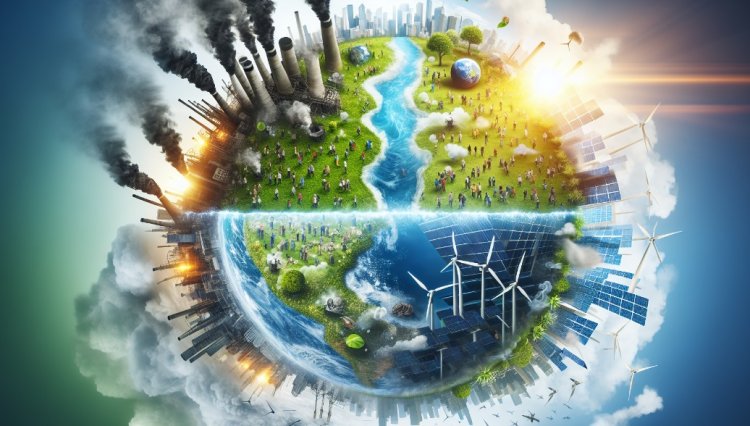Economy in Transition | Problems Aging Population | Social Changes
"Examine the profound challenges and social changes brought about by an aging population in a transitioning economy. This article delves into the economic impacts, policy considerations, and societal adaptations necessary to address the complexities of an increasingly older demographic."

Introduction
The importance of demographics in shaping a country's economic future cannot be understated. The demographic makeup of a nation, including factors such as age, birth rate, and population growth, can have a profound impact on its economic growth and development. In particular, the aging population is a key demographic trend that many countries are grappling with, and it poses significant challenges to economic growth.
As the population ages, fewer people of working age can contribute to the workforce and drive economic productivity. This leads to a decrease in the overall productive capacity of the economy and can result in slower economic growth. Additionally, as the elderly population grows, there is an increased demand for healthcare and social services, which can strain government budgets and resources.
Nations must adapt to changing demographics to mitigate the negative impact on economic growth. This may involve implementing policies that encourage fertility rates, such as family-friendly policies and incentives for families to have more children. It may also involve attracting immigrants to fill the gaps in the workforce and help support economic growth.
In conclusion, demographics play a crucial role in shaping a country's economic future. The ageing population and its impact on economic growth are significant challenges that nations must address. By adapting to changing demographics and implementing appropriate policies, countries can navigate the challenges and ensure continued economic prosperity.
The Global Balance of Power
Population size, economy, and global influence are closely intertwined. The more people a country has, the larger its economy is likely to be, which in turn gives it more power and influence on the global stage. This is why countries like the US and European nations have historically been influential in shaping global policies.
The US, as the world's largest economy, has been a dominant global leader for decades. Its economic strength has allowed it to shape and influence global policies in areas such as trade, security, and climate change. Similarly, European countries, as a collective unit, have also had significant influence on global policy, particularly through organisations like the European Union.
However, the global balance of power is not static and is subject to change. One factor that could potentially impact power dynamics is demographic shifts. As the world's population continues to grow and age, it will have profound economic implications. An ageing population means more people consuming goods and services and fewer people producing them. This can lead to slower economic growth and potentially create challenges for countries trying to maintain their global influence.
On the other hand, countries with fast-growing working-age populations, particularly in Africa and Southeast Asia, may experience a demographic window that supports economic growth. For example, India, with its young and growing population, is projected to be one of the fastest-growing economies in the world.
In conclusion, population size, economy, and demographic shifts all play a role in shaping the global balance of power. While countries like the US and European nations have traditionally held significant influence due to their population size and economic strength, demographic shifts could potentially alter power dynamics in the future. Countries need to adapt to these changes and implement policies that support economic growth and maintain their global influence.
The Ageing Population and its Economic Implications
The ageing population is a significant demographic trend that many countries are currently facing. This demographic shift has important implications for the economy, particularly in terms of consumption and production.
-
As the population ages, fewer people of working age can contribute to the workforce and drive economic productivity. This decrease in the overall productive capacity of the economy can result in slower economic growth.
-
Additionally, as the elderly population grows, there is an increased demand for healthcare and social services. This can strain government budgets and resources, leading to potential challenges in providing adequate support and services for the ageing population.
Countries with ageing populations may experience a potential slowdown in economic growth. With a smaller workforce, there may be a decrease in innovation, productivity, and overall economic output. This can have implications for a country's competitiveness and global influence.
Another important aspect to consider is the relationship between ageing populations and interest rates. As the population ages, people tend to save more and spend less. This can lead to a decrease in consumer spending, which can impact businesses and economic growth. Additionally, an increase in the elderly population can put upward pressure on interest rates, as there is a larger demand for borrowing to finance healthcare and retirement needs.
In conclusion, the ageing population poses significant economic challenges for countries. Governments must carefully navigate these challenges by implementing policies that encourage fertility rates, attract immigrants to fill workforce gaps, and ensure adequate support and services for the ageing population. By addressing these issues, countries can mitigate the potential negative impact of an ageing population and ensure continued economic prosperity.
Demographic Trends in Developing and Developed Economies
The demographics of a country play a crucial role in shaping its economic future. This is true for both developing and developed economies, but the challenges and opportunities they face can be quite different. In this section, we will explore the demographic trends in these two types of economies and the impact they have on economic growth.
The Demographic Sweet Spot and its Impact on Economic Growth in Developing Economies
In developing economies, there is often a demographic sweet spot where the majority of the population is of working age. This means that more people can contribute to the workforce and drive economic productivity. This demographic advantage can lead to faster economic growth and development.
When a country has a larger working-age population, there is an increase in consumer spending and investment, which fuels economic growth. This demographic dividend, as it is often called, can provide a significant boost to developing economies and help lift people out of poverty.
The Challenges Faced by Developed Economies with Ageing Populations and High Levels of Debt
On the other hand, developed economies are facing the challenges of an ageing population and high levels of debt. As the population ages, fewer people of working age can contribute to the workforce. This leads to a decrease in the overall productive capacity of the economy and can result in slower economic growth.
Additionally, the ageing population creates an increased demand for healthcare and social services, which can strain government budgets and resources. This poses significant challenges for developed economies, especially those with high levels of debt, as it becomes more difficult to sustain economic growth and manage the needs of an ageing population.
The Need for Countries to Adapt Their Policies to Manage Demographic Changes
To effectively manage demographic changes, countries need to adapt their policies to address the specific challenges they face. For developing economies, this may involve investing in education and healthcare to capitalize on the demographic dividend and ensure long-term economic growth.
For developed economies, it is important to implement policies that encourage fertility rates, attracts immigrants to fill workforce gaps, and ensure adequate support and services for the ageing population. These countries must also find ways to manage their high levels of debt and stimulate economic growth in the face of demographic challenges.
Overall, demographic trends have a significant impact on the economic growth and development of both developing and developed economies. By understanding and adapting to these trends, countries can navigate the challenges and opportunities they present and ensure continued economic prosperity.
Inequality and its Impact on the Economy
The growing concern over income inequality
Income inequality has become a major issue of concern in recent years. The wealth gap between the richest and poorest individuals has widened significantly, with the top 1% holding more than half of the world's wealth. This extreme level of inequality has sparked debates and protests around the globe as people question the fairness and sustainability of such a system. The concentration of wealth in the hands of a few not only raises ethical concerns but also has profound implications for the economy as a whole.
The relationship between income inequality and economic growth
Studies have shown that income inequality is closely linked to slower economic growth. When a large portion of the population has limited purchasing power, it can lead to a decrease in consumer spending, which in turn can dampen demand and hinder economic expansion. Additionally, extreme income inequality can lead to social and political instability, which further hampers economic progress. On the other hand, reducing income inequality and promoting a more equitable distribution of wealth can have positive effects on economic growth, as it ensures that more people have the means to participate in the economy and contribute to its success.
The potential consequences of extreme income inequality
Extreme income inequality can have a range of negative consequences for both individuals and the economy as a whole. Some of these potential consequences include:
-
Higher levels of poverty and social unrest
-
Decreased social mobility and limited opportunities for upward economic mobility
-
Greater strain on government resources and budgets as the demand for social services and support for the most vulnerable in society increases
-
Decreased overall economic productivity and innovation as a result of limited access to education and resources
-
Increased political and economic power in the hands of a few, leading to potential corruption and unequal influence over policy-making
In conclusion, income inequality is a significant issue that has far-reaching implications for the economy. It hampers economic growth, undermines social cohesion, and perpetuates a cycle of poverty and limited opportunities. Addressing income inequality and promoting a more equitable distribution of wealth is not only a matter of social justice but also a crucial step towards ensuring long-term economic stability and prosperity.
Tackling inequality and promoting social mobility
Inequality is a growing concern in today's society, with the wealth gap between the richest and poorest individuals continuing to widen. This extreme level of inequality not only raises ethical concerns but also has profound implications for the economy as a whole. Studies have shown that income inequality is closely linked to slower economic growth. When a large portion of the population has limited purchasing power, it can lead to a decrease in consumer spending, which in turn can dampen demand and hinder economic expansion. Additionally, extreme income inequality can lead to social and political instability, further hampering economic progress.
Addressing inequality and promoting social mobility is crucial for reducing income inequality and ensuring a more equitable distribution of wealth. Social mobility, or the ability of individuals to move up the social and economic ladder, is directly linked to reducing income inequality. By providing individuals with opportunities to improve their educational and economic prospects, social mobility can help break the cycle of poverty and limited opportunities.
Promoting social mobility requires a combination of factors, including economic growth, access to education and healthcare, and supportive government policies. Economic growth is essential to providing job opportunities and increasing incomes for individuals. Access to quality education and healthcare is also crucial in equipping individuals with the skills and resources they need to succeed and move up the social ladder.
Governments play a vital role in addressing inequality and promoting social mobility. They can implement policies that ensure equitable access to education and healthcare, as well as provide support for low-income families. Governments can also work to reduce barriers to economic opportunity, such as discrimination and a lack of affordable housing.
In conclusion, tackling inequality and promoting social mobility are essential for reducing income inequality and creating a more equitable society. By focusing on economic growth, access to education and healthcare, and supportive government policies, we can create a society where everyone has the opportunity to succeed and contribute to economic prosperity.
The Clean Disruption: Renewable Energy and the End of Fossil Fuels
The transformative power of renewable energy is revolutionising the world. With the growth of solar power and the potential for batteries and electric vehicles, the end of fossil fuels is on the horizon. This clean disruption not only has major implications for the energy landscape but also for economies that heavily rely on fossil fuels.
The transformative power of renewable energy
Renewable energy, such as solar power, is changing the way we generate and consume energy. With advancements in technology and decreasing costs, renewable energy sources are becoming increasingly affordable and efficient. This transition to renewable energy is not only beneficial for the environment but also for the economy.
By shifting away from fossil fuels and embracing renewable energy, countries can reduce their carbon emissions and mitigate the impacts of climate change. This transition also creates new job opportunities in the renewable energy sector, stimulating economic growth and innovation.
The Growth of Solar Power and Its Impact on the Energy Landscape
Solar power is one of the fastest-growing sources of renewable energy. The falling costs of solar panels and advancements in technology have made solar power a viable and cost-effective option for many countries.
Countries like Italy, Germany, and Morocco have already embraced solar power and are reaping the benefits. Morocco, for example, has built the world's largest solar power plant in the desert, which has the potential to provide energy to millions of people and transform the country's economy.
As more countries invest in solar power, the energy landscape is shifting away from centralised power plants to decentralised systems. This allows individuals and businesses to generate their own electricity, reducing reliance on traditional energy sources and increasing energy independence.
The Potential for Batteries and Electric Vehicles to Revolutionise Transportation
The development of batteries and electric vehicles is transforming the transportation sector. Electric vehicles are becoming more affordable and accessible, with major car manufacturers investing heavily in electric vehicle production.
With the growth of electric vehicles, the demand for batteries is also increasing. Advances in battery technology are making it possible to store renewable energy and use it during times of high demand or when the sun is not shining. This not only improves the reliability of renewable energy sources but also allows for greater energy independence.
The Implications for Fossil Fuel-Dependent Economies
Fossil fuel-dependent economies may face significant challenges as the world transitions to renewable energy. Countries that heavily rely on fossil fuels for their economies, such as Saudi Arabia and Russia, may need to diversify their energy sources and invest in renewable energy technologies to remain economically competitive.
However, this transition also presents opportunities for fossil fuel-dependent economies. By investing in renewable energy technologies, these countries can position themselves as leaders in the clean energy sector and attract investment and new industries.
In conclusion, the clean disruption of renewable energy is transforming the world. The growth of solar power, advancements in battery technology, and the rise of electric vehicles are revolutionising the energy landscape. While there are challenges for fossil fuel-dependent economies, there are also significant opportunities for economic growth and innovation. The transition to renewable energy is not only necessary for mitigating climate change but also offers a sustainable and prosperous future for all.
Clean Disruption in Action: Examples from Morocco and South Africa
In the transition towards renewable energy, Morocco and South Africa are leading the way with their innovative clean energy initiatives. These countries are demonstrating the potential of renewable energy to transform their energy landscapes, providing both economic and environmental benefits.
The world's largest solar power plant is in Morocco.
Morocco is home to the world's largest solar power plant, located in the desert. This massive solar facility has the potential to provide energy to millions of people and transform the country's economy. With a surface area of 1.4 million square metres and about 500,000 mirrors, the solar power plant uses a parabolic mirror system to capture and concentrate sunlight. The concentrated heat is then used to generate electricity, which can be stored using molten salt for up to three hours, allowing for continuous power generation even after sunset. This solar power plant showcases the tremendous potential of solar energy in providing clean, sustainable power.
Using plastic waste to generate clean energy in South Africa
In South Africa, a pioneering startup called Rethaka is tackling two major issues—plastic waste and lack of access to electricity—by converting discarded plastic bags into solar-powered school bags. These bags are fitted with a solar-powered charger that charges during the day and provides light at night. This innovation not only helps to address the problem of plastic pollution but also provides a safe and sustainable source of lighting for students and their families, who may otherwise rely on dangerous fuels like kerosene. This initiative demonstrates the potential of renewable energy to provide practical solutions to pressing social and environmental challenges.
Economic and environmental benefits
These clean energy initiatives in Morocco and South Africa offer significant economic and environmental benefits. By transitioning to renewable energy sources like solar power, these countries can reduce their carbon emissions and mitigate the impacts of climate change. The growth of solar power also creates new job opportunities in the renewable energy sector, stimulating economic growth and innovation. Additionally, the use of plastic waste to generate clean energy not only helps to tackle plastic pollution but also improves access to electricity and promotes sustainable development.
In conclusion, the clean disruption in action in Morocco and South Africa showcases the transformative power of renewable energy. These countries are leading the way in harnessing the potential of solar power and innovative solutions to address both environmental and social challenges. With the economic and environmental benefits of these clean energy initiatives, it is clear that the transition towards renewable energy is not only necessary but also offers tremendous opportunities for sustainable development and prosperity.
Conclusion: The Future of Energy and the Global Economy
The clean disruption of renewable energy is on the horizon, and its impact on the global economy cannot be ignored. With the growth of solar power, advancements in battery technology, and the rise of electric vehicles, the end of fossil fuels is fast approaching. This clean disruption not only has major implications for the energy landscape but also for economies that heavily rely on fossil fuels.
The transition to clean energy sources like solar power and the development of battery technology have significant benefits for both the environment and the economy. By reducing carbon emissions and mitigating climate change, countries can create a more sustainable future. Additionally, the growth of the renewable energy sector creates new job opportunities and stimulates economic growth and innovation.
However, this transition also presents challenges for fossil fuel-dependent economies. Countries that heavily rely on fossil fuels for their economies, such as Saudi Arabia and Russia, may need to diversify their energy sources and invest in renewable energy technologies to remain economically competitive. While there may be short-term disruptions and adjustments, the long-term benefits of a clean energy future far outweigh the costs.
As the world shifts towards clean energy, there is also the potential for a shift in global power dynamics. Countries that embrace and invest in renewable energy technologies will position themselves as leaders in the clean energy sector and attract investment and new industries. This could potentially alter power dynamics and create new opportunities for economic growth and innovation.
In conclusion, the clean disruption of renewable energy is inevitable and will have a profound impact on the global economy. The shift away from fossil fuels towards clean energy sources like solar power, advancements in battery technology, and the rise of electric vehicles will revolutionise the energy landscape. While there may be challenges for fossil fuel-dependent economies, there are also significant opportunities for economic growth and innovation. The transition to renewable energy is not only necessary for mitigating climate change but also offers a sustainable and prosperous future for all.



 admin
admin 










